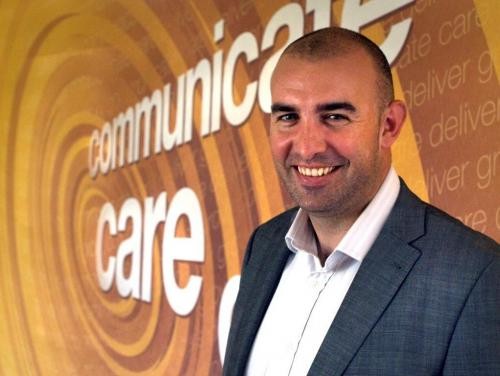 Outsourcery's co-CEO Piers Linney thunders about the cloud and like a true dragon breathes fire into his conviction that the channel should kick its addiction to legacy equipment.
Outsourcery's co-CEO Piers Linney thunders about the cloud and like a true dragon breathes fire into his conviction that the channel should kick its addiction to legacy equipment.
Few have the courage of their convictions like entrepreneur Piers Linney who fervently believes that cloud services are the only game in town. Headlines about the PBX being in crisis and on the brink of collapse have been the cloud evangelist's fodder for years. But Linney's deftly delivered homily on the future, or rather the demise of tin speaks volumes in a market gripped by the forces of restless morph and transition. And those resellers that resist the pressures to change their modus operandi will be addressing an ever decreasing market, believes Linney, who warned stick-in-the-mud comms and IT companies that being wedded to a defunct strategy with legacy at its core is tantamount to folly. "The days of selling physical equipment will soon be over," he said. "The Internet has transformed consumer technology and it's now happening in business. Customer awareness will wash over much of the channel and resellers paralysed by inaction will miss the boat."
Discussing the cloud is likely to result in discord between the proponents of change and those sceptics whose inertia will ensure that they remain tightly wedged between a rock and a hard place, an uncomfortable position from which to observe a new reality in which the customer is now far more aware of the opportunity to move to the cloud and more willing to make the shift than their incumbent supplier. "The pace of change will be systemic, steady and permanent, and the channel will reach a point of no return," said Linney. "Companies are held back from selling cloud services because of their legacy ways of thinking, old systems and outdated processes. Consider the woes of Blockbuster or HMV who saw it coming for 10 years, but were paralysed by legacy."
He noted that a big challenge in transitioning to the cloud is the shift to providing services with SLAs and the real-time support of more complex converged services within a subscription model. But co-opting social and consumer trends for the purpose of survival should, you would think, be the natural course to take for any entrepreneur with a growth strategy, but a large proportion of resellers still believe that the cloud is a dangerous game to play despite widespread awareness among end users who have experienced first hand the benefits of hosted services in their personal lives.
Channel inertia is a bugbear that grates Linney by the day and remains, for the time being, a brain-teaser. "I cannot understand as an entrepreneur why, given the size of the cloud opportunity you wouldn't grasp it with both hands," he stated. "We see more people starting businesses from scratch reselling what we do and having more success than a company that has been around for 10 years. For a traditional business, talking about hosted email and server virtualisation takes them out of their comfort zone. That's a conversation they would rather avoid so they revert to selling what they know best. But do not underestimate the conversation. Voice is just one feature of an app like Lync."
This case of inertia could be recorded as one of the biggest ironies in the history of comms because, at a time when certain cloud solutions are relatively easy to sell via systems like Outsourcery's 'cloud business in a box', many established channel companies find it frustratingly difficult to make a decision in favour of selling them primarily because they baulk at the idea of changing their business model, which Linney concedes can be painful, but he qualifies this concession with the fact that sitting on your hands is simply not an option. "We know the pain," noted Linney. "In the beginning we took a struggling mobile company and transformed it, invested millions, started from scratch, and invested millions again to grasp the opportunity. Early movers will make a lot of money, but a looming inflection point will render the transition too difficult for those who do nothing now."
The struggling mobile company cited by Linney was Genesis Communications, the telecoms arm of DSG International which he and former colleague Simon Newton acquired in 2007 and renamed to Outsourcery following a six month period of strategising over the new brand and its wider significance. "Outsourcery is not just a name," noted Linney. "It embodies the company's values, our office design and open culture, down to our informal dress code. We try to be 'Internet-ey' but not a Google or a Skype. What we do is serious, so striking an equilibrium between being funky and relaxed while operating with absolute professionalism is an interesting balance."
The quest for balance can be traced back through Linney's career which includes notable stints as a qualified solicitor and former investment banker. His academic career includes a degree based on the fusion of two subjects of interest, accounting and law. Accountancy because Linney in those days associated numbers with business - he knew he wanted to be a businessman but exactly what that meant was at the time unclear. And law was close to another subject of interest, history. Balancing the two was a short-term exercise which ended when Linney decided to be a lawyer while most of his academic colleagues took the accountancy route. This was an early sign that Linney doesn't always do the expected, a trait that changed the format, for one episode at least, of Channel 4's series The Secret Millionaire - which we'll come to later in this article.
"Getting a law training contract was difficult but I was accepted," he explained. "A year later I questioned whether I really wanted to be a partner in a glass office. The company I worked for focused on venture capital and I was fascinated by the deals they were doing, the structures, the funds, the entrepreneurs, all of that was happening in front of me. I was far more interested in the deal than the law. A job offer in investment banking was to follow but it was business at 30,000 feet and not really me."
The penny dropped from an equally high altitude in 2000 when Linney's gaze fell squarely on the Internet and its associated business opportunities. "The Internet opportunity seemed like a gold rush, a once in lifetime chance," he said. "I had the ability to raise capital and do something interesting. This was my chance to really start a business. I raised some money and established a dot-com. Looking back at my career I've always been interested in telecoms, media and technology."
Linney was then involved in the media business - dance music and Internet radio - and after a period of time he took over a venture capital fund, cleaned it up and used it as a vehicle to establish a niche investment bank. "I started raising money from hedge funds to do deals," he explained. "My interest has always been TMT so my investments had a TMT slant. Then we found Genesis and saw an opportunity to buy a company and build a hosted services business focused on the cloud. Outsourcery today embodies everything that interests me - telecoms, technology, cloud, all driven by the Internet. We've bought four companies, sold two and floated on the stock market. My whole skill set and interests are reflected in Outsourcery."
The company's fully converged cloud platform was built from scratch for SME and gold plated for resilience. However, SME in the past has been slower to adopt cloud solutions than top end customers better able to calculate the benefits. "This partly explains why most of our partners are large organisations," added Linney. "But SME is the Holy Grail. We'll stop at companies with 20-50 people that care about ICT. Below that is not a battle we're ever going to win. Over the next two years cloud will filter down from the top while greater levels of awareness raised by products such as Office 365 and Lync will also drive demand."
It follows that the channel will experience a shake-out and will have to consolidate as the delivery of services shifts to scale CSPs, noted Linney. "The local service and support relationship is important but the business model will need to move into reselling resilient services with robust SLAs provided by CSPs that have invested tens of millions," he said. "Value will be added through professional services, integration and support services. This is the business model of the future for the majority of the market, especially the smaller resellers, while larger resellers may have more services and networking capabilities to integrate."
Linney would argue that Outsourcery is transforming the channel format, an influence that he carried through into his TV career which began when he was approached by Channel 4 to feature in an episode of The Secret Millionaire. Linney went undercover in a prison for young offenders and his gravitation towards individuals rather than charities as a whole meant much of the programme's stock in trade content ended up on the cutting room floor in a break from tradition. "The programme makers want you to focus on charities but I got sidetracked by individuals," said Linney. "It's difficult in that environment to assist an individual, especially if they're in prison. So the story grew in a new direction and my other significant donations were edited out. We subsequently employed one former prisoner. He had an interest in IT and proved to be the right person for the job. He has now been promoted as a Cloud Transition Specialist. We gave him an opportunity to change his life and he grasped it."
It's one thing to be in business and strive for growth, but another to drive change at the same time on both an individual and industry-wide level. Again, Linney has fused these elements into a cohesive strategy. "We are focused on what we need to do in terms of facilitating a channel transition, and our business is now about how fast we can scale and add revenue," added Linney.
"We'll be going international within a few years due to demand from larger customers. And as our profile grows more opportunities are coming through the front door. We want to create a brand that attracts opportunities like this that we can feed to partners. HP is working with us and investing to generate leads for partners. It understands that the profile of server sales is changing because CSPs will be the purchasers of hardware in the future. HP recognises this shift in the supply chain as more services are delivered over IP."
It comes as no surprise that Linney features in The Power List of the 100 most influential black Britons, but just as notable are the influential figures in his life that perhaps moulded the entrepreneur and instilled a strong work ethic and an equally powerful spirit of family and community. "My role models are my parents," he said. "My father was academic, a Mancunian working class lad who got to Cambridge. That was rare in those days. My mother came over from Barbados to be a nurse and also worked hard. Many of the people my parents knew had built their own businesses and all this made a big impression on me. I always knew I wanted to be in business."•
To read more about Piers Linney, his experiences, charity work and TV career visit www.pierslinney.com
In a burgeoning TV career cloud entrepreneur Piers Linney has replaced Theo Paphitis on BBC's Dragons' Den, lining up alongside Duncan Bannatyne, Peter Jones, Deborah Meaden and fellow new dragon Kelly Hoppen for the BBC2 show's 11th series which kicked off last month.

 Total has bolstered its mobile Focus Partner Channel with the appointment of Ben Foulds as Partner Manager. His remit is to build on existing partner relationships and support new partners entering the mobile market.
Total has bolstered its mobile Focus Partner Channel with the appointment of Ben Foulds as Partner Manager. His remit is to build on existing partner relationships and support new partners entering the mobile market. By Claire Darley, Head of Indirect Sales, O2: UK retailers are missing out on £12 billion of potential sales by failing to engage consumers through digital channels. That's according to a new study by retail analysts Conlumino which found that retailers are struggling to harness technologies that enhance customer experiences inside and outside the store.
By Claire Darley, Head of Indirect Sales, O2: UK retailers are missing out on £12 billion of potential sales by failing to engage consumers through digital channels. That's according to a new study by retail analysts Conlumino which found that retailers are struggling to harness technologies that enhance customer experiences inside and outside the store. Outsourcery's co-CEO Piers Linney thunders about the cloud and like a true dragon breathes fire into his conviction that the channel should kick its addiction to legacy equipment.
Outsourcery's co-CEO Piers Linney thunders about the cloud and like a true dragon breathes fire into his conviction that the channel should kick its addiction to legacy equipment. Despite many years at the top of his game Channel Telecom's rising star Matt Donaldson - Channel Manager - gives the impression he is just part-way along a career path that will lead him to make a significant impact on the wider comms industry landscape.
Despite many years at the top of his game Channel Telecom's rising star Matt Donaldson - Channel Manager - gives the impression he is just part-way along a career path that will lead him to make a significant impact on the wider comms industry landscape.